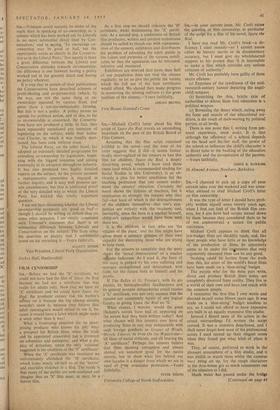SIR,—Michael Croft's letter about his film script of Spare the
Rod reveals an astonishing ineptitude on the part of the British Board of Film Censors.
Assuming that the film script remained faithful to the novel—and the tone of his letter suggests that it did—it seems fantas- tically short-sighted of the censors to ban this film for children. Spare the Rod, a deeply disturbing novel, which 1 have read three times (and which is recommended reading for Social Studies in this University), is so ob- viously a plea for better conditions for the teaching profession that one cannot under- stand the censors' objection. Certainly the novel shows the failures of teachers, but it emphasises so strongly the reasons why they fail—not least of which is the destructiveness of the children themselves—that one's sym- pathies are entirely with the teachers; and, inevitably, since the hero is a teacher himself, children's sympathies would have been with them too.
It is the children, in fact, who arc 'the villains of the piece,' and the film might have given them a salutary glimpse of their own capacity for destroying those who arc trying to help them.
• For the censors to complain that the story sh ws the 'moral deterioration' of a teacher ist uitc ludicrous. As I read it, the hero of the story is purged by his own suffering and emerges strengthened and determined, with faith for the future both in himself and his pupils.
If The Belles of St. Triniatt's, with its gin parties, its hermaphroditic headmistress and its general juvenile debaucheries could receive a 'U' certificate, one can only assume that the censors are completely bereft of any logical .faculty in giving Spare the Rod an 'X.'
What chance. I wonder, would the great Dickens's novels have had of; appearing on the screen had they been written today? And what chance will this country ever have of producing films in any way comparable with such foreign products as Grapes of Wrath,


































 Previous page
Previous page